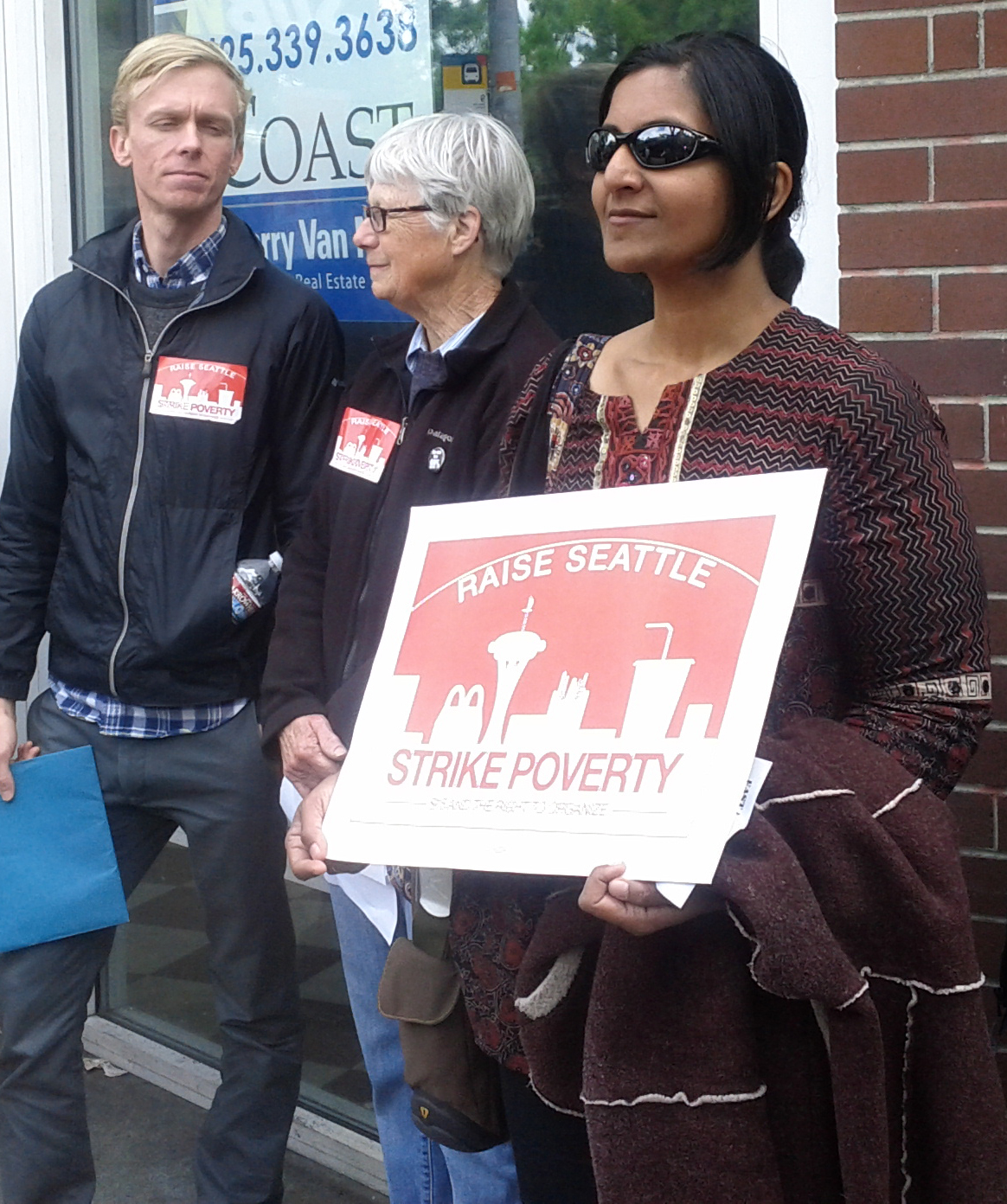Adding punctuation to what’s been a dizzying last week for Kshama Sawant’s campaign for Seattle City Council Position 2, today the Socialist Alternative candidate will be at City Hall issuing a challenge to current Council members and the two men vying for the Mayor’s office.
According to a press release from the Sawant campaign, Sawant and “other advocates of a $15/hour minimum wage, including Abdi Mohammed of the Somali American Political Action Committee,” will stand in front of City Hall today at 1 p.m. “calling on council members and both mayoral candidates to sign a public pledge to support Seattle adopting a $15/hour minimum wage ordinance in 2014.” According to the press release, Sawant and the other gathered supporters will stand “with a large pledge display for Sawant, the councilmembers, McGinn and Murray to sign.”
Publicity stunt, yes … but there’s no denying the $15 an hour minimum wage debate has legs in Seattle.
“As voters send in their ballots they deserve to know clearly which candidates and elected officials will move rapidly to implement a $15 an hour minimum wage in Seattle and who does not,” Sawant says in her campaign press release. “There has been lots of talk about the issue, but little in specifics or clear commitments. Today is an opportunity to make it crystal clear what they will do.”
Where Sawant stands on the issue is obvious. Who else will put their name on the pledge remains more of a mystery – but that’s not to say the challenge will be laughed off. As Bloomberg noted Sunday, both of Seattle’s mayoral candidates have come around to the idea – with Ed Murray campaign consultant Sandeep Kaushik going as far as to take to Twitter to point out that his man was “the first to offer [a] living wage proposal.” (Take that, McGinn.)
Bloomberg sums up the situation in Seattle bluntly, writing: “Much of the U.S. would scoff at mandating a full-time pay equivalent of $31,200 a year, but in the biggest metropolitan area in the Pacific Northwest it’s an idea taken very seriously.”
Indeed it is, and as City Councilmember Mike O’Brien told Seattle Weekly last week, the fact that the Emerald City is having a $15 an hour minimum wage discussion in this year’s election is largely thanks to Sawant. The Seattle Times’ Danny Westneat has already proclaimed Sawant the “big winner” in this year’s election, largely because of the traction the $15 an hour minimum wage debate is now getting.
So who will take Sawant’s challenge and sign the pledge this afternoon? Only time will tell. McGinn spokesperson Aaron Pickus wasn’t tipping the Mayor’s hand, telling Seattle Weekly only: “The mayor has previously stated that he looks forward to working with the City Council and others so that Seattle is the first major city to adopt a $15 minimum wage. It was in our campaign literature.”
Meanwhile, Kaushik tells Seattle Weekly: “We’ll be putting out a statement shortly reiterating Ed’s support for a living wage.”
UPDATE 2:55 pm: As promised, the Murray campaign has issued a statement “reiterating Ed’s support for a living wage.”
Here it is:
Back in September, when Mayor McGinn was still, as the Seattle Times reported, “stop[ping] short of endorsing a $15-an-hour minimum wage for Seattle, saying the wage should be set at the state level,” Ed Murray publicly put forward a $15-an-hour living wage proposal as the centerpiece of his “Economic Opportunity Agenda” for Seattle.
Ed continues to stand by that commitment. As he said at the time, if elected Ed will work with the City Council, businesses, labor and community partners to move forward thoughtfully and incrementally on living wage standards, providing pathways to the middle class by improving the buying power of working people.
Ed would begin the process by bringing together representatives of business, labor, the Council and other stakeholders to negotiate an agreement on a living wage proposal that will be implemented in the City of Seattle. Those conversations will include: implementation of a $15 dollar per hour minimum wage standard for City employees and contractors; moving forward on achieving the goal of a $15/ hour wage for large scale industries like national big-box retail and fast food brands; and implementing thresholds and phasing options to avoid adverse effects to small businesses and restaurants, while rewarding best practices and recognizing the critical importance of local, neighborhood entrepreneurs.








